[Click here to view the PDF version]
-
Researchers at IMH, Duke-NUS, and A*STAR have developed advanced brain-computer interface technology that harnesses machine learning to personalise brain-training for children with ADHD.
-
Partnering with local tech start-up, Neeuro, the researchers are rolling out a pilot home-based intervention programme for children with ADHD undergoing treatment at IMH. The take-home kit comprises a wireless headband and a Samsung tablet with the pre-loaded game.
-
Extensive clinical testing through a large-scale randomised clinical trial of the game-based brain-training programme found improvements in the attention span of children with ADHD.
Singapore, 6 November 2019 – A first-of-its-kind personalised, interactive brain-training game will soon be helping children with Attention Deficit Hyperactivity Disorder (ADHD) improve their attention span. The unique selling point of this technology is that children with ADHD can participate in this programme from home. A pilot run for the home-based programme will be launched for 20 children, aged 6-12 years, who are currently receiving treatment for ADHD at the Institute of Mental Health (IMH).

CogoLand
The game, called CogoLand[1], was developed through a decade’s worth of extensive research, utilising Brain-Computer Interface (BCI) technology that incorporates machine learning algorithms to personalise attention training, with the hope of complementing mainstay ADHD treatment. The use of CogoLand to complement ADHD treatment is the result of a collaboration between IMH, Duke-NUS Medical School, and A*STAR’s Institute for Infocomm Research (I2R). Neeuro Pte Ltd, a local tech startup and spinoff from A*STAR, is the current sole licensee of the technology.
This non-invasive ADHD intervention programme was the subject of a large-scale randomised clinical trial funded by the National Medical Research Council, involving 172 children with ADHD in Singapore[2]. Associate Professor Lee Tih Shih, from Duke-NUS’s Neuroscience and Behavioural Disorders programme and Principal Investigator of the large scale clinical trial, commented: “Our patented, personalised intervention using advanced BCI technology has shown very promising and robust results, and we hope it can benefit many children with ADHD in the future.”
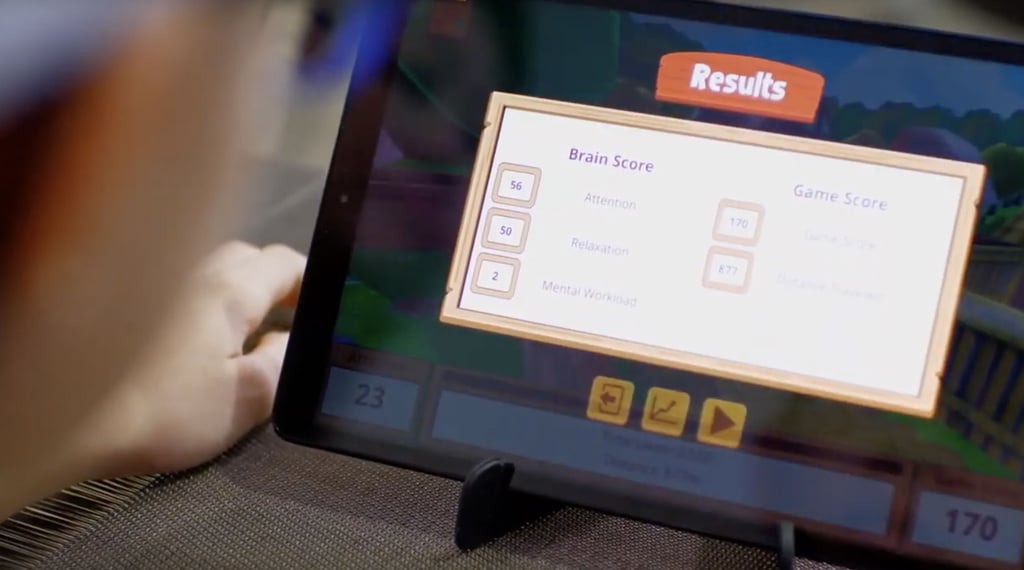
Furthermore, Functional Magnetic Resonance Imaging (fMRI) scans of a subset of the children, led by Associate Professor Juan Helen Zhou, also from Duke-NUS, showed positive post-training effects observed in brain areas associated with attention and task-orientation[3].
The patented technology was summarised by Professor Guan Cuntai, technical lead of the system and scientific advisor to Neeuro: “Our technology can accurately quantify a person’s attention level in real-time using a machine learning algorithm and, from there, develop a unique patented personalised training programme using a feed-forward concept for cognitive training. Further improvements have been made in recent iterations by capitalising on the latest deep learning approaches with our large dataset.” Professor Guan Cuntai was also the Principal Scientist who led the BCI research when he was part of A*STAR’s I2R.
Neeuro Aiming to Utilise Technology to Enable Positive Change
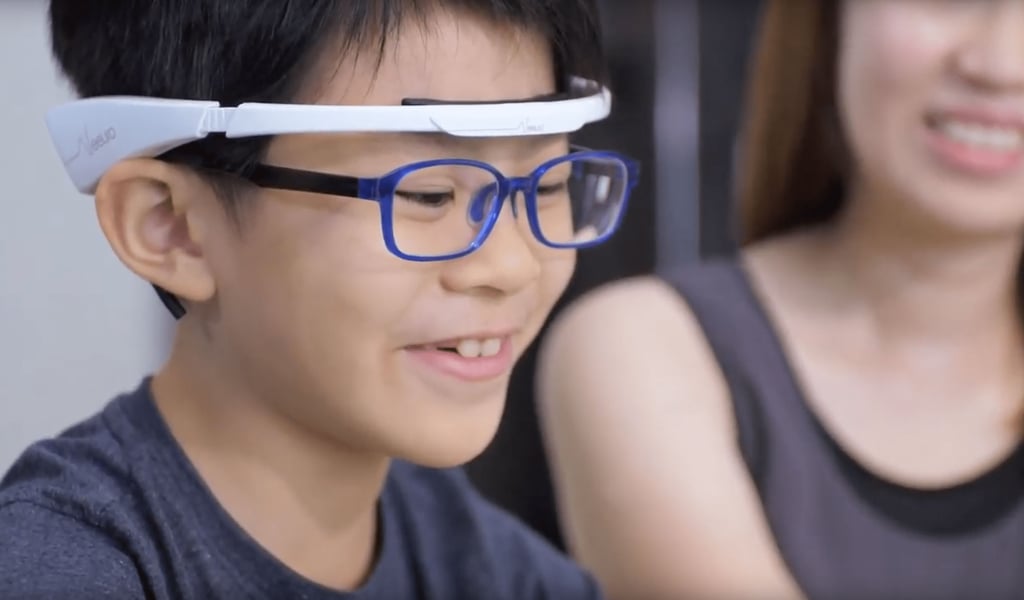
Dr. Lim Choon Guan, Deputy Chief of the Department of Developmental Psychiatry at IMH said: “While medication and behavioural therapy are effective in treating symptoms of ADHD in children, some parents are also keen to explore other approaches that can help their children to improve their concentration. After a decade of collaborative work, our team is very excited to pilot this home-based brain-training game which parents can use to help their children regulate themselves.” The home-based programme will see the 20 children each receive a take-home kit that includes Neeuro’s brainwave-reading SenzeBand and a Samsung tablet with the preloaded CogoLand game, which they will use following a prescribed regimen for the duration of the programme. This approach is intended to be a complement and/or supplement to conventional ADHD treatment.
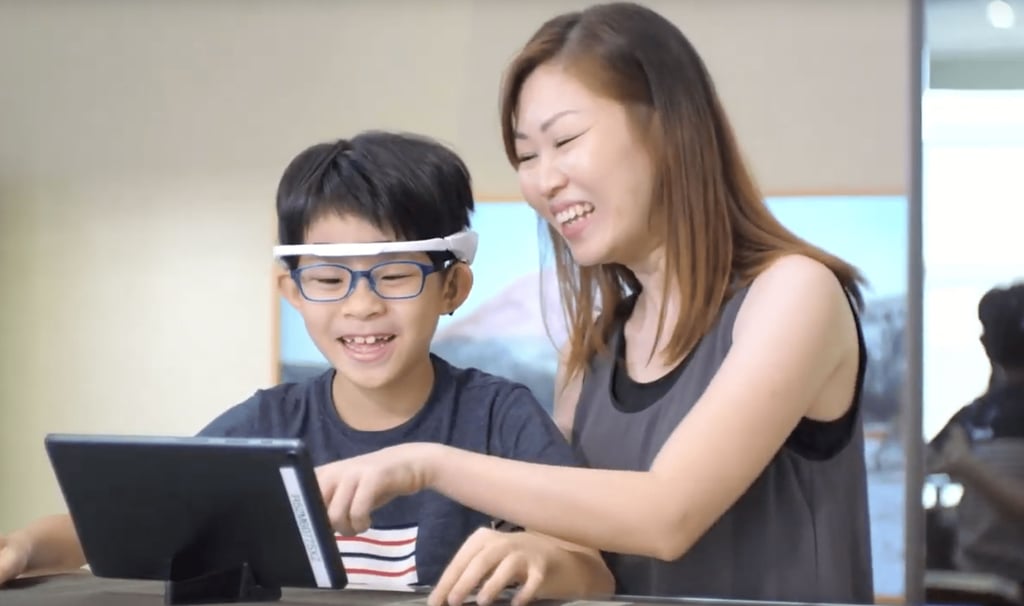
According to Dr. Alvin Chan, CEO and Co-Founder of Neeuro, “At Neeuro, our aim is to utilise technology to enable positive change in the neurological agility and fitness of our users. We are privileged to be working with institutions such as IMH, Duke-NUS, and A*STAR, in conjunction with our hardware partner Samsung, to explore the use of cutting-edge technology in order to achieve this aim. It is our hope that this trial paves the way to enable the progressive development of new complementary options that will bring about positive outcomes for the millions of children afflicted with ADHD globally, especially those in Singapore.”
Mr. Philip Lim, CEO of A*STAR’s innovation and enterprise office A*ccelerate, said: “It is always fulfilling when homegrown technologies are translated into meaningful outcomes. We are proud to be a part of Neeuro’s journey, and A*STAR will continue supporting entrepreneurial companies like them to grow and innovate.”
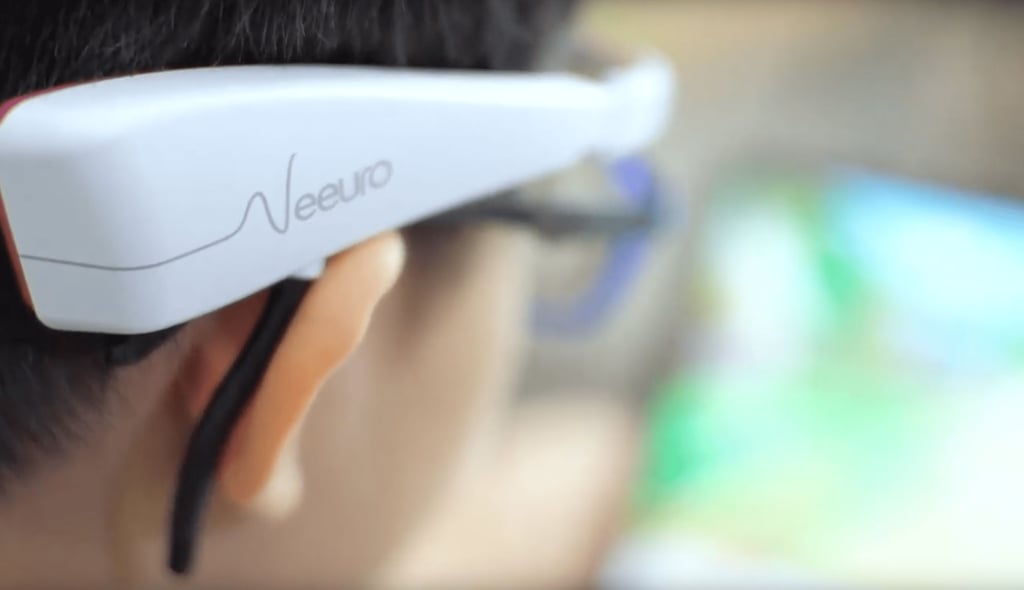
[1] See Annex A for more information on CogoLand.
[2] Lim, C., Poh, X., Fung, S., Guan, C., Bautista, D., & Cheung, Y. et al. (2019). A randomized controlled trial of a brain-computer interface-based attention training program for ADHD. PLOS ONE, 14(5), e0216225. DOI: 10.1371/journal.pone.0216225
[3] Qian, X., Loo, B., Castellanos, F., Liu, S., Koh, H., & Poh, X. et al. (2018). Brain-computer-interface-based intervention re-normalizes brain functional network topology in children with attention-deficit/hyperactivity disorder. Translational Psychiatry, 8(1). DOI: 10.1038/s41398-018-0213-8
Note: The research study was funded by grants from the National Medical Research Council (NMRC) and National Healthcare Group (NHG). The research team also acknowledges the support received from the Ministry of Education, Singapore.
About Neeuro
Neeuro is a global company which specialises in the utilisation of Brain-Computer Interface technology to maximise the potential of users’ neurological agility and fitness. Neeuro’s extensive portfolio and an array of offerings empower digital therapeutics and brain fitness solutions and are backed with clinically validated research by A*STAR, an institution widely known as being at the forefront of Singapore’s research endeavours.
Its core technology, NeeuroOS, is a platform ecosystem that empowers health care professionals, researchers, and third-party developers with an Artificial Intelligence (AI) driven platform with the ability to analyse the brain signals of users; measuring mental states including but not limited to attention, relaxation, mental workload, and fatigue. Neeuro’s holistic platform, coupled with its other offerings, reveals numerous potential avenues to explore complementary mental wellness options for ADHD children, patients with stroke, cognitive rehabilitation, and many other neurological issues.
For more information, please visit https://www.neeuro.com.
Comms Contacts
|
Calvin Wee |
Fiona Foo |
| Federico Graciano Duke-NUS Communications Tel: +65 6601 3272 Email: f.graciano@duke-nus.edu.sg |
Gladys Chung A*STAR Tel: +65 6826 6111 Email: Gladys_chung@hq.a-star.edu.sg |
Annex A: About CogoLand
CogoLand is a locally developed game that was created based on BCI technology developed at A*STAR’s Institute for Infocomm Research (I2R). Neeuro licensed the technology that created CogoLand and developed it into a commercial product, which consists of the SenzeBand headband to track brain signals as well as the CogoLand mobile application. The aim of the game is to move a character through a maze. Unlike most games where users use a gamepad or touchscreen, the character’s movements can only be controlled by brainwaves. By keeping the mind focused on the character, the character moves forward. A loss of focus results in the character slowing down or remaining stationary. At higher levels, the user also needs to hit a button on the touchscreen to make the character jump while moving at the same time.
Users will be required to pair the CogoLand mobile application with a Neeuro SenzeBand for the detection of brainwaves. The user dons the SenzeBand headband, which has six sensors to track his/her brainwaves. Machine learning algorithms will capture and interpret the mental states of users based on their brainwaves, and these subsequently drive various challenges within the game.
Brainwaves and health data are captured through the SenzeBand headband and will be transmitted in real-time via Bluetooth wireless technology to CogoLand. Neeuro has partnered with Samsung for the application to be deployed on their tablets leveraging on Samsung Knox mobile security solution. Click here to watch their YouTube video or go to http://bit.ly/samsung-healthcare-video.
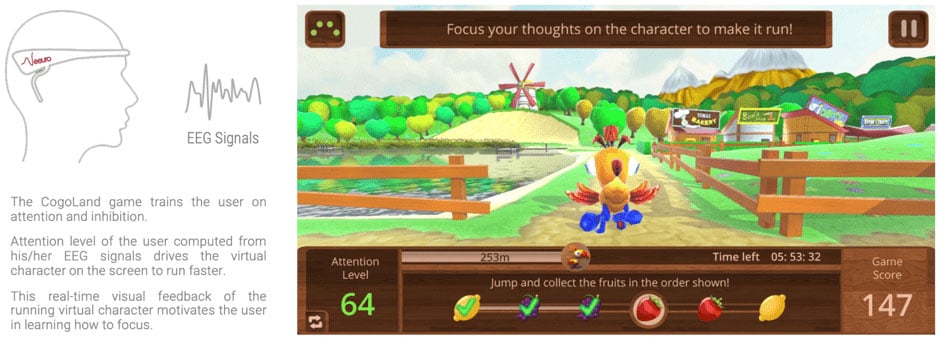
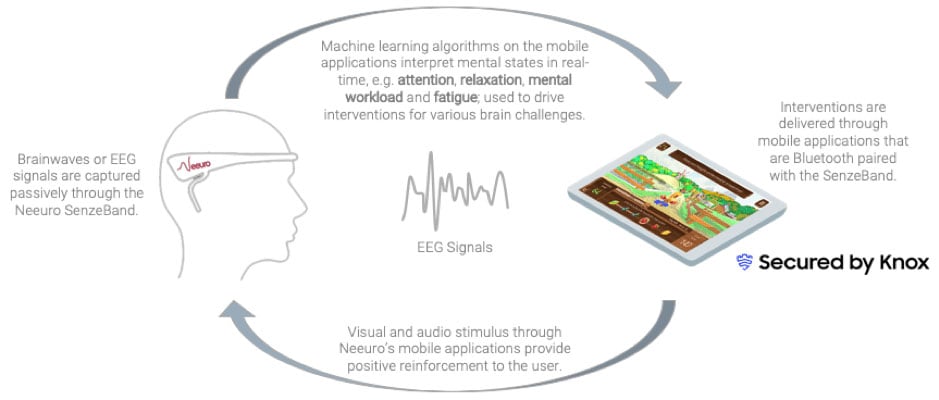
Annex B: About ADHD
ADHD is a neurodevelopmental disorder that affects approximately two to 2 to 7% of children globally[1], with a growing number of cases in people aged 5 to 44 years worldwide. Common symptoms represented by 38 to 57% of ADHD children include inattention and poor focus.
In Singapore, IMH sees about an average of 600 to 800 children and adolescents with ADHD every year, with the trajectory on the rise as parents and educators become more aware of the condition. The current management for ADHD includes medication and behavioural interventions where a clinician teaches both the parents and child strategies to reduce ADHD behaviours. Besides equipping the child with self-regulation strategies, it is also essential for parents to pick up various parenting strategies to guide and aid their child at home, as well as for teachers to better facilitate the child’s learning in school. Besides current pharmacology and behavioural interventions offered in the clinics, the BCI programme can be offered to parents as an additional treatment option that is home-based.
As each child may present with different ADHD-related behaviours, it is important for parents to speak with a mental health professional to discuss the treatment options for the child. The proposed training programme does not claim to treat ADHD or replace professional medical advice. It offers an alternative modality that may complement conventional therapy approaches and address the gaps or shortcomings in mainstay treatment.
[1] https://adhd-institute.com/burden-of-adhd/epidemiology/

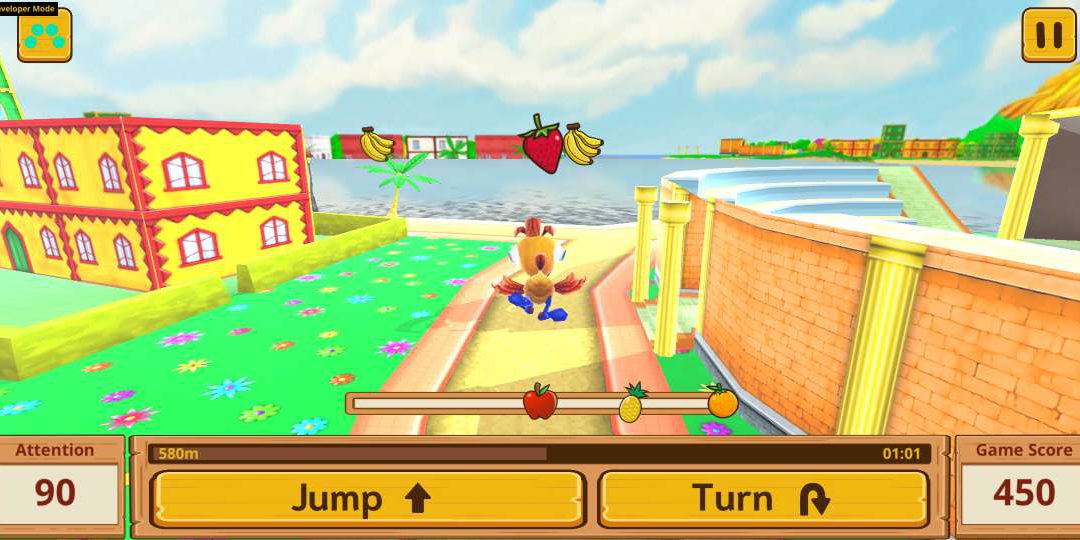




Leave a Comment